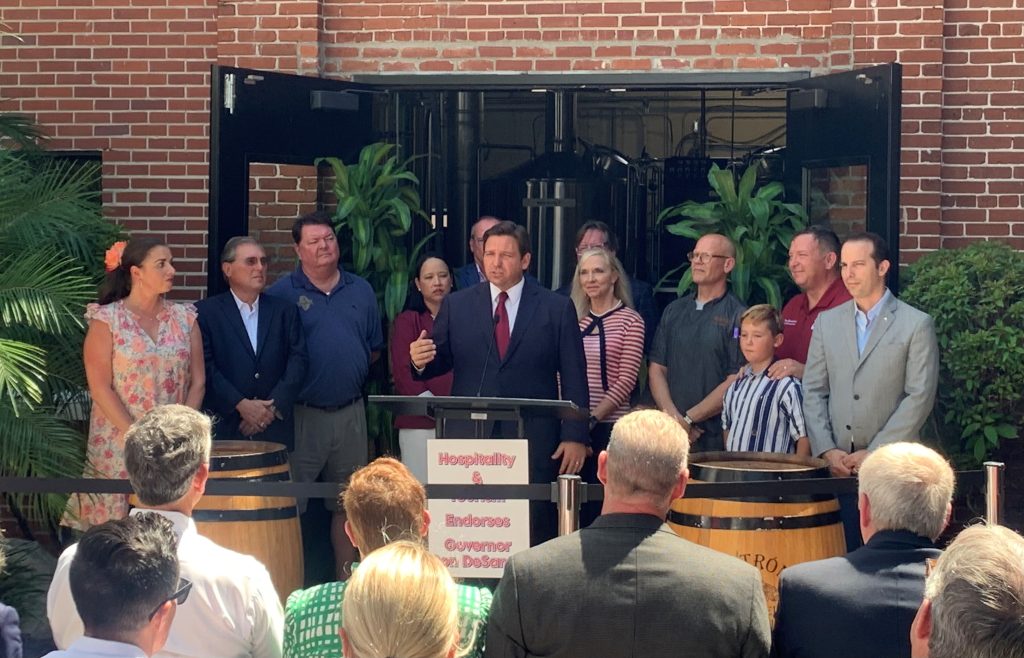| MEMORANDUM
Executive Order 22-219 (Amending Executive Order 22-218, Emergency Management – Tropical Depression Nine)
Today, Governor Ron DeSantis issued Executive Order 22-219 (Amending Executive Order 22-218, Emergency Management – Tropical Depression Nine), expanding the state of emergency statewide.
On September 23, 2022, Tropical Depression Nine strengthened into Tropical Storm Ian, with maximum sustained winds of 40 miles per hour. The threat posed by Tropical Storm Ian requires that timely precautions are taken to protect the communities, infrastructure, and general welfare of Florida.
A copy of Executive order 22-219 can be found here.
STATE OF FLORIDA
OFFICE OF THE GOVERNOR
EXECUTIVE ORDER NUMBER 22-219
(Amending Executive Order 22-218, Emergency Management – Tropical Depression Nine)
WHEREAS, on September 23, 2022, I issued Executive Order 22-218 and declared a state of emergency exists for several counties in Florida’s Peninsula and the Florida Keys due to Tropical Depression Nine; and
WHEREAS, as of 11:00 PM EDT on September 23, 2022, Tropical Depression Nine strengthened into Tropical Storm Ian, with maximum sustained winds of 40 miles per hour; and
WHEREAS, as of 8:00 AM EDT on September 24, 2022, Tropical Storm Ian was approximately 855 miles southwest of Key West, Florida; and
WHEREAS, Tropical Storm Ian is forecasted to become a major hurricane before making landfall along Florida’s West Coast; and
WHEREAS, the Florida Division of Emergency Management, working together with the National Hurricane Center to evaluate weather predictions, has determined there is a continuing risk of dangerous storm surge, heavy rainfall, flash flooding, strong winds, hazardous seas, and isolated tornadic activity for Florida’s Peninsula and portions of the Florida Big Bend, North Florida, and Northeast Florida; and
WHEREAS, the threat posed by Tropical Storm Ian requires that timely precautions are taken to protect the communities, critical infrastructure, and general welfare of Florida; and
WHEREAS, as Governor, I am responsible to meet the dangers presented to Florida and its people by this emergency.
NOW, THEREFORE, I, Ron DeSantis, as Governor of Florida, by virtue of the authority vested in me by Article IV, Section 1(a) of the Florida Constitution and by the Florida Emergency Management Act, as amended, and all other applicable laws, promulgate the following Executive Order, to take immediate effect:
Section 1. Section 1 of Executive Order 22-218 is amended to read as follows:
Because of the foregoing conditions, which are projected to constitute a major disaster, I declare a state of emergency exists in the State of Florida.
Section 2. Except as amended herein, Executive Order 22-218 is ratified and reaffirmed.
Section 3. This Executive Order is effective immediately and shall expire upon the expiration of Executive Order 22-218.
IN TESTIMONY WHEREOF, I have hereunto set my hand and caused the Great Seal of the State of Florida to be affixed, at Tallahassee, this 24th day of September, 2022.
###
_________________________________________________________________
From the Office of The Attorney General
TALLAHASSEE, Fla.—Attorney General Ashley Moody today expanded Florida’s Price Gouging Hotline as Tropical Storm Ian intensifies. The expansion comes following Governor Ron DeSantis’s amended executive order expanding the state of emergency to all 67 counties in Florida. Floridians statewide can now report instances of severe price increases on essential commodities needed to prepare for the storm to the Attorney General’s Office. Florida’s price gouging law only applies to commodities and services essential to preparing for, or recovering from, a storm during a declared state of emergency.
Attorney General Ashley Moody said, “As Tropical Storm Ian intensifies, I am expanding Florida’s Price Gouging Hotline statewide. Please watch Ian closely, and as you prepare for a potential storm strike, report incidences of price gouging to my office.”
To view the executive order expanding the state of emergency, click here.
During a storm-related declared state of emergency, state law prohibits excessive increases in the price of essential commodities, such as food, water, hotel rooms, ice, gasoline, lumber, equipment and storm-related services needed as a direct result of the event.
Anyone who suspects price gouging can report it to the Florida Attorney General’s Office by using the No Scam app, visiting MyFloridaLegal.com or calling 1(866) 9NO-SCAM. Attorney General Moody’s No Scam app can be downloaded for free on Apple and Android devices through the app store by searching No Scam.
For tips on reporting price gouging, click here.
For more information on price gouging, click here.
Violators of the price gouging statute are subject to civil penalties of $1,000 per violation and up to a total of $25,000 for multiple violations committed in a single 24-hour period. In addition to the civil penalties for price gouging, state law criminalizes the sale of goods and services to the public without possession of a business tax receipt.
To download Attorney General Moody’s Scams at a Glance: Price Gouging brochure in English, click here. To download the Spanish version, click here.
For tips on what to do before and after a storm strikes, download the 2022 Hurricane Preparedness Guide here. For the Spanish version, click here. |

